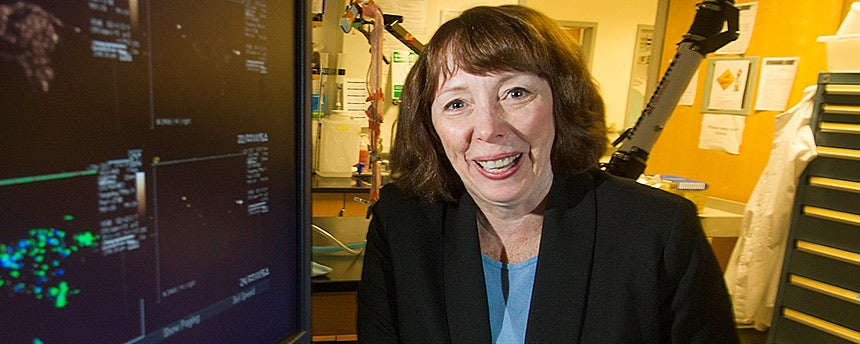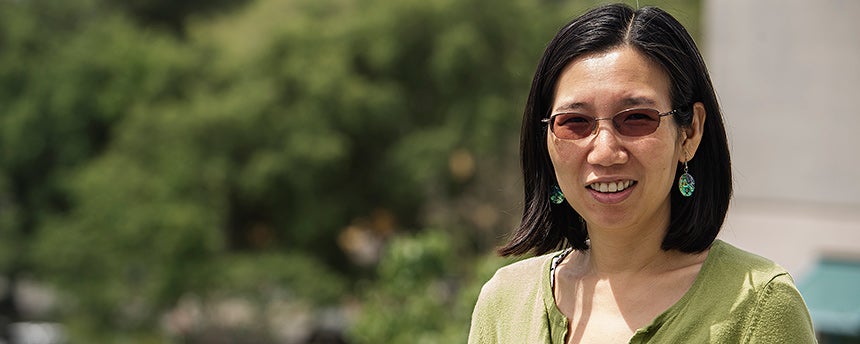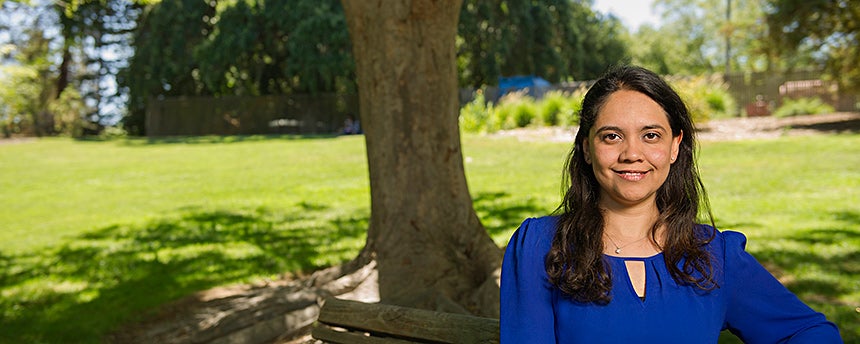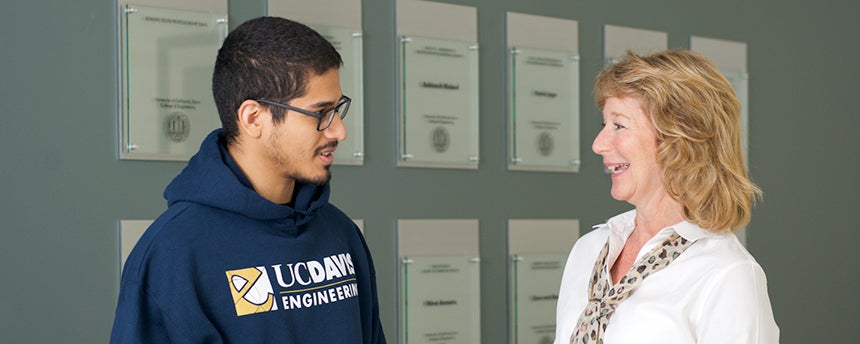Quick Summary
- These faculty members are breaking new ground in diverse engineering fields.
- UC Davis ranks third in the nation among the top 50 engineering schools for percentage of women faculty.
- Dean Jennifer Sinclair Curtis says having women faculty as mentors and advisers is important for the next generation.
For National Women in Engineering Day June 23, meet four UC Davis College of Engineering faculty who are breaking new ground in areas as diverse as using medical imaging for gene delivery to designing platforms for data collection.
Although more women are entering engineering programs than ever before, a recent study found women comprise just 20 percent of all engineering graduates in the U.S. And women with careers in engineering also find themselves in the minority: According to the same study, only 11 percent of practicing engineers are women.
UC Davis’ bachelor’s and master’s engineering programs are about 30 percent women and the doctoral program about 25 percent women. In fact, we rank third in the nation among the top 50 engineering schools for percentage of women faculty.
Jennifer Sinclair Curtis, who became UC Davis College of Engineering’s first woman dean last October, describes the university’s commitment to fostering the creative potential of all students.
“Women engineering students need to see the role models. They need to see the path,” says Curtis. “Having women faculty to serve as mentors and advisers is really important to foster the next generation of women engineers.”
Katherine Whittaker Ferrara, distinguished professor of biomedical engineering

How did you get interested in engineering?
My dad was an early biomedical engineer who worked on the development of a heart pacemaker and the first left-ventricular assist device. As a teenager, I loved physics but became a physical therapist due to the desire to directly impact patient health. In my 20s, I lost a child of my own, in part due to a difficulty in making a diagnosis at that time, and became interested in creating techniques — such as biomedical imaging — to speed diagnosis.
Tell us about your research
We work on the development of methods to deliver drugs and genes under the guidance of medical imaging. We use all forms of medical imaging and interventional techniques to enhance delivery. We also synthesize unique drug carriers.
What excites you most about your work?
We find that we can greatly enhance drug delivery — 50 fold in some cases — and by combining drug therapy and immunotherapy we see the potential to treat, and in some cases cure, difficult cancers.
Advice for female students interested in engineering?
I truly believe that as a biomedical engineer we have the best of all careers. It is exciting and impactful, and we are always learning something new.
Fun fact?
My husband is also an engineer, and we met working on the development of ultrasound technologies.
Chen-Nee Chuah, professor of electrical and computer engineering

How did you get interested in engineering?
I was good in math and physics in high school and enjoyed playing computer games. I also have an older brother and sister who are electrical engineers. I was told that electrical engineering involves both math and physics, so I chose to study electrical engineering as my undergraduate major to keep my options open. When I was an undergrad, I was very fortunate to have a chance to perform undergraduate research in the area of wireless networking. My project was to analyze different hand-off algorithms for cellular phones. That motivated me to pursue the field of communications and networking. I published my first two papers when I graduated from college and went on to pursue my M.S. and Ph.D. degrees.
Tell us about your research
My main research area is in communication networks and wireless/mobile computing, with emphasis on developing techniques for measuring, analyzing, and modeling dynamic interactions between network entities and protocol-layers as well as users’ network access and interaction patterns. We study the whole data pipeline, from designing innovative programmable platforms for data collection to applying statistical and machine-learning techniques on massive data sets. We also design more robust systems like designing better resource allocation schemes for delivering better end-to-end quality of service, or more effective security detection systems. I am also involved in interdisciplinary projects such as leveraging wireless communications for intelligent transportation system design, and improving services on online social platforms.
What excites you most about your work?
As the Internet and hand-held devices become an essential part of our everyday life, the resulting online mobile-social ecosystem has grown to be extremely complex and challenging to characterize or manage. Yet it plays an important role in shaping our social, political and economical landscapes. It is exciting to be part of the digital evolution and have an opportunity to design solutions that have societal impact.
Advice for female students interested in engineering?
Be curious. Be persistent. Ask lots of questions. Find good mentors. Master technical writing and presentation skills. Don’t be afraid to fail — it is OK to not know the answers right away; it is OK to see something for the first time even though the rest of your peers seem to have known or mastered the subject for a while; it is OK to make mistakes (just make sure you learn from them).
Fun fact?
I like to paint and play the piano.
Cindy Rubio Gonzalez, assistant professor of computer science

How did you get interested in engineering?
My dad is an electrical engineer, and he inspired me to pursue a career in engineering. However, choosing computer engineering happened almost by chance. I started a bachelor’s degree in piano performance when I was 11 years old, and I completed the first five (out of eight) years of this bachelor’s while doing high school. At the end of high school, I knew I wanted to pursue a career in engineering while finishing the last three years of my bachelor’s in music. In Mexico, students are required to decide on their major before applying for admission. I remember selecting industrial engineering. I was attracted to computer engineering, but I didn’t have any computer background, whereas most of my friends had already taken several programming courses in high school. A few days before the entrance exam, my dad encouraged me to switch to computer engineering, and I followed his advice. The first year was particularly challenging, but soon I knew I had made the right choice.
Tell us about your research
My research spans the areas of programming languages and software engineering with a specific focus on program analysis. The goal of my research is to design and build program-analysis tools that help developers write more reliable and efficient software. For instance, I have developed program analyses to detect incorrect error handling in large software systems. In addition to finding hundreds of confirmed bugs in the Linux kernel and the Mozilla Firefox web browser, the analyses also found a critical bug in heavily tested code used for space missions by the NASA/Jet Propulsion Laboratory. Most recently I developed analyses to improve the performance of numerical programs. One such tool is Precimonious, a dynamic analysis tool that explores the trade-off between floating-point accuracy and performance of a program.
What excites you most about your work?
It is very exciting to have the possibility to improve the reliability and performance of real-world programs used by millions of people.
Advice for female students interested in engineering?
I would advise students to learn more about computer science and the many career opportunities it offers. Take computer science courses as soon as you have the chance. First-hand experience will help you find what it is you feel passionate about. Find other students who share your interests and mentors to guide you. Look for opportunities to get involved in research. Regardless of the field of study that you choose, taking the initiative will always make the difference!
Fun fact?
I enjoy playing in ensembles, and I love jogging.
Jennifer Sinclair Curtis, dean of the College of Engineering

How did you get interested in engineering?
I went to Northwest High School in Cincinnati, Ohio, and my high school counselor suggested that engineering would be a good fit for me. I took his advice, although in high school, I knew nothing about engineering and personally knew no engineers. When I was in college and starting taking engineering courses, I realized he was right; engineering was a good — great! — fit for me. He was a pretty forward-thinking counselor in 1978.
Tell us about your research
My research involves the simulation of fluid-particle flows that are found in applications such as the production of gasoline, biomass reactors, pharmaceutical tablet production, drug delivery, etc. We investigate ways to change fluid or particle properties or their flow rates to optimize or improve mixing, reaction, product uniformity or targeted delivery of fluid-particle flows.
What excites you most about your work?
It is very exciting to see how the students that I am working with on various projects grow in their technical knowledge and to be a part of that growth. In addition, I am also learning something new every day.
Advice for female students interested in engineering?
Go for it! Engineering is a wonderful career with so many possibilities for job function — whether it be design, technical sales, product development, research or on the plant/operational side. In addition, the types of applications are so varied — from energy to food to medicine to electronics to infrastructure to transportation, to name a few.
Fun fact?
I’m an avid Zumba dancer.
Media Resources
Lisa Howard, 530-752-8117, lehoward@ucdavis.edu